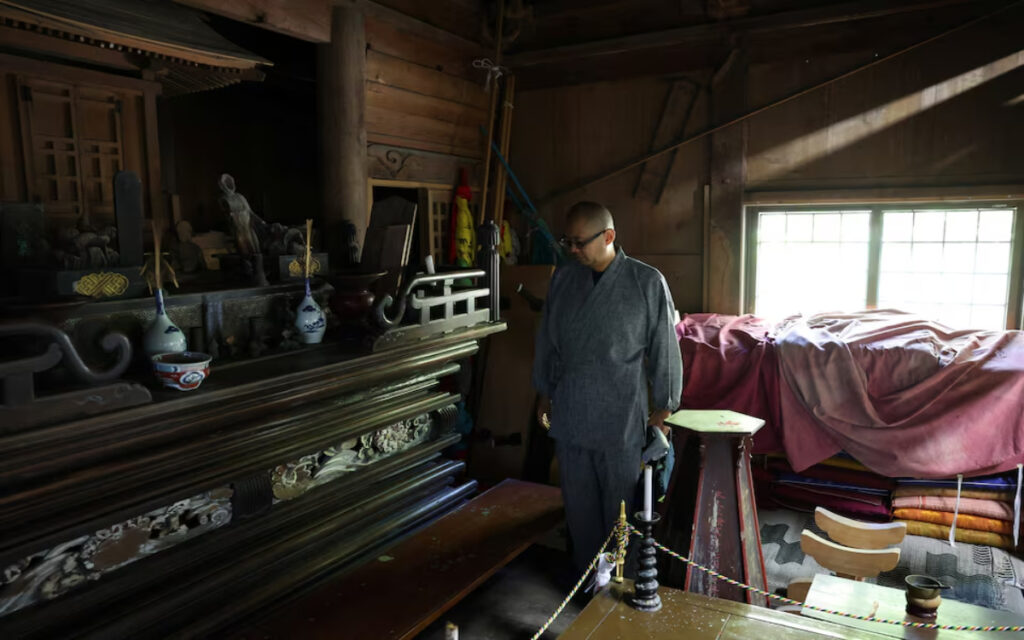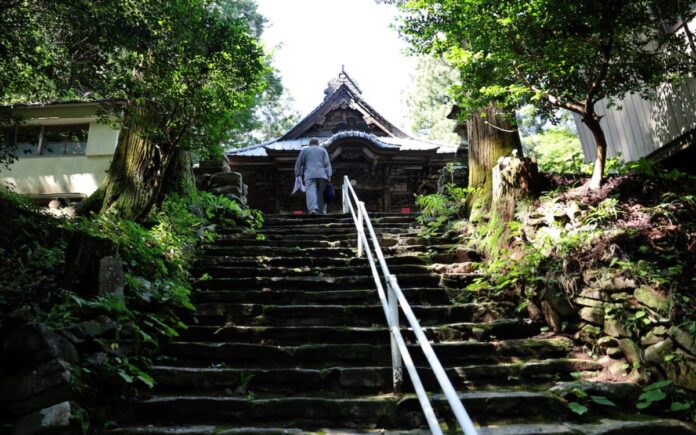Sanbagawa: Benmou Suzuki’s dilapidated 420-year-old temple, nestled deep in the forest of a small Japanese mountain village, may not seem like prime real estate. Yet, the monk was recently approached by two men claiming to be real estate brokers interested in purchasing the property. Suzuki suspects their real motivation lies not in the ornate building at the trailhead of a sacred mountain, but in the special tax status associated with running a religious property.
“There are people out there who want a temple, even a mountain temple like this. In fact, considering the value of the religious corporation status, this temple could fetch quite a lot of money,” said the 52-year-old Suzuki.

As Japan’s population declines and interest in religion wanes, fewer individuals contribute to the maintenance of the country’s numerous temples and shrines. For instance, Suzuki’s Mikaboyama temple is located in Sanbagawa, a three-hour drive from Tokyo, home to only 500 residents and three other Buddhist temples, one Shinto shrine, and a church.
This uptick in religious properties for sale has alarmed Japanese authorities, who fear that many prospective buyers are not interested in these sites for spiritual purposes. Instead, they worry about tax evasion or potential money laundering. “It’s already a sense of crisis for us and the religious community,” said an official from Japan’s Agency for Cultural Affairs, which oversees religious sites.
The extensive repurposing of temple or shrine properties has sparked public outrage. In Osaka, a temple sold in 2020 was later demolished, with dozens of graves relocated for property development. This year, a temple in Kyoto made headlines after it was razed to create a parking lot.
Owning a temple, shrine, or church recognized as a religious corporation in Japan can offer significant tax benefits. Businesses operating under such corporations that provide religious services, like funerals, are exempt from taxes, while other non-religious businesses enjoy preferential tax rates. A wide array of enterprises, from restaurants to hotels, can operate under this status.
As of the end of 2023, Japan had approximately 180,000 religious sites with corporation status, according to agency data. The number of so-called inactive corporations—those that have not held religious events for over a year—has surged by a third to more than 4,400.
Typically, when monks or priests pass away without a successor, the overseeing religious group appoints someone to take over or relinquishes the site’s corporation status. However, around 7,000 religious sites operate independently of these groups, making them easier to acquire, according to the agency and specialist brokers.
To combat bad-faith purchases, the cultural affairs agency has intensified efforts to dissolve the corporation status of inactive religious sites. Following major earthquakes that often damage temples and shrines, agency officials visit affected religious groups to warn them about potential unscrupulous buyers.
Last year, 17 religious corporations were voluntarily dissolved, and six were ordered to dissolve. The agency expects these numbers to rise in the coming years as scrutiny increases.
Also Read | China Invites Increased Indian Investment Amid Renewed Economic Ties
While tightening laws on purchasing religious sites may seem like a solution, the agency is cautious about amending legislation related to religion, as this could be seen as infringing on religious freedom guaranteed by Japan’s constitution.
An investigation by Reuters into six websites specializing in religious property sales revealed hundreds of listings, most described vaguely to maintain seller privacy. Osaka-based broker Takao Yamamoto noted a surge in interest, stating that a religious corporation license can sell for 30 million yen ($210,000), with some religious sites, particularly those with lucrative graveyards, listed for millions.
Also Read | Supply Chain Concerns Mar Huawei’s $2,800 Smartphone Debut
“Anyone can buy independent sites as long as you have money…even foreigners can buy them. Recently, a lot of Chinese people are trying to buy them,” Yamamoto said.
For his part, Suzuki has no plans to sell Mikaboyama temple and is actively seeking ways to raise funds for its maintenance. “Temples are places for local people to gather and forge connections. We just can’t get rid of them,” he affirmed.



